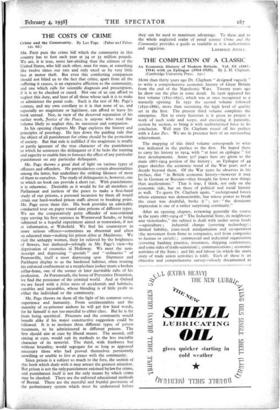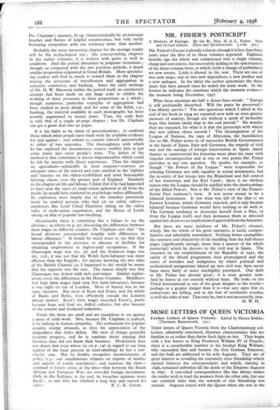THE COMPLETION OF A CLASSIC
An Economic History of Modern Britain. Vol. III (1887- 1914) with an Epilogue (1914-1929). By J. H. Clapham. (Cambridge University Press. 25s.)
Moan than thirty years ago Dr. Clapham "designed vaguely" to write a comprehensive economic history of Great Britain from the end of the Napoleonic Wars. Twenty years ago he drew out the plan in some detail. In 1926 appeared his first volume (1820-1850), which was at once recognised as a masterly opening. In 1932 the second volume followed (1850-1886), more than sustaining the high level of quality set in the first. The present third volume completes the enterprise. Not to every historian is it given to project a work of such scale and scope, and executing it patiently, section by section, to bring it with undiminished force to its conclusion. Well may Dr. Clapham round off his preface with a Laus Deo. We are in presence here of an outstanding achievement.
The mapping of this third volume corresponds to what was indicated in the preface to the first. He hoped there to carry his history to 1914, with "at least an epilogue" for later developments. Some 5o7 pages here are given to the main 1887-1914 portion of the history ; an Epilogue of 44 pages sketches the economic trend of the War years and a decade beyond them. Of the War years he observes in his preface, that "in British economic history—however it may be in German or Russian—they brought far fewer new things than accelerations." That is true, I think, not only on the economic side, but on those of political and social history as well. To quote Dr. Clapham again, "underground forces whose existence was demonstrable, but whose power to break the crust was doubtful, broke it " ; yet-" the dominant impression is one of a rather surprising continuity."
After an opening chapter, reviewing generally the course in the years 1887-1914 of" The Industrial State, its neighbours and vicissitudes," the subject is dealt with under seven heads —agriculture ; industrial change (covering technology) ; limited liability, joint-stock amalgamation and co-operation (the movement from firms to companies, and from companies to fusions or cartels) ; commercial and industrial organisation (covering banking practice, insurance, shipping conferences, and some sides of trade-unionism) ; communications ; economic activities of the State ; and life and labour (in which the main story of trade union activities • is told). Each of these is an objective and comprehensive survey—closely documented in Dr. Clapham's manner, lit up characteristically by picturesque touches and flashes of helpful reminiscence, but only rarely betraying sympathies with one tendency more than another.
Probably the most interesting chapter for the average reader will be the technological one ; like corresponding chapters in the earlier volumes, it is written with gusto as well as erudition. And the period abounded in poignant inventions ; though, as compared with the two previous periods, a much smaller proportion originated in Great Britain. More specialis- ing readers will find as much to reward them in the chapter tracing the processes of trustification and aggregation in industry, commerce, and banking. Since the early writings of Mr. H. W. Macrosty within the period itself, no satisfactory attempt had been made on any large scale to exhibit the working of these processes in their proportions as a whole ; though numerous particular examples of aggregation had been studied in great detail, and for some of the fields, e.g., banking, the material available in such monographs has been notably augmented in recent years. True, the scale here is only that of a single 91-page chapter ; but Dr. Clapham can get a great deal into 91 pages.
It is his habit to be chary of generalisations ; to confront those which other people have made with the available evidence for and against ; and seldom to commit himself unreservedly to either of two opposites. The thoroughness with which he has explored the documentary sources enables him to put some water into most people's wine. The defect of the method is that sometimes it misses imponderables which could be felt by anyone with direct experience. Thus his chapter on agriculture—admirable in most respects—conveys no adequate sense of the misery and ruin entailed in the 'eighties and 'nineties on the oldest-established and most honourable farming classes over the greater part of England. Similarly in the chapter on life and labour, I think that if he had happerred to have seen the 1911-12 trade-union upheaval at all from the inside, he would have rendered its psychology rather differently. Its explosions were largely due to the mistakes previously made by exalted persons who had sat on safety valves— employers .like Lord Claud Hamilton sitting on the safety valve of trade-union negotiation, and the House of Lords sitting on that of popular law-breaking.
• Occasionally there is something like a failure to see the obvious ; as where on p. 97, discussing the differences between farm wages in different counties, Dr. Clapham says that "the broad divisions corresponded roughly with differences in labour efficiency." It would be much truer to say that they corresponded to the presence or absence of facilities for obtaining employment in higher-paid occupations. If the Glamorgan wage was 2IS. 3d. and the Somerset wage was 16s. I'd., it was not that the Welsh farm-labourer was more efficient than the English ; for anyone knowing the two sides of the British Channel (as I happened to do) would be aware that the opposite was the case. The reason simply was that Glamorgan was dotted with rich coalmines. Similar explan- ations cover the differences in the Home Counties. Middlesex had high farm wages (and very few farm-labourers), because it was right on top of London. Most of Surrey was in the same situation. But most of Kent and Esiex, and the whole of Bucks and Berks, were effectively outside the London labour market. Kent's farm wages exceeded Essex's, partly because hops and fruit are skilled cultures, but also because
of the Cement and dockyard industries. • - -
Points like these are small and are exceptions to set against a mass of solid work. Nor, because Dr. Clapham is judicial, is he lacking in human sympathy. His enthusiasm for popular creative energy abounds, as does his appreciation of the doggedness that defies -defeat. His view of change generally assumes progress, and he is cautious about arguing that business men did not know their business. Moderation does not desert him even where (as on p. 147 in regard to our long neglect of the basic process in steel-smelting) he has a con- clusive case. But he frankly recognises inconsistencies of policy (e.g., our simultaneous reliance on exports of textiles and exports of textile machinery), and endorses the view— confined to lonely critics at the time—that between the South African and European Wars we over-did foreign investment. Only in the Epilogue at the end, he broaches opinions more freely ; as one who has climbed a long way and earned his















































 Previous page
Previous page